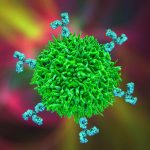- MS risk stems from genetic and lifestyle/environmental factors, such as smoking and Epstein Barr virus (EBV) exposure.
- Closely related family members with or without MS grow up in similar environments and share similar lifestyles, providing a unique opportunity to study MS genetics.
- MS Australia-supported researchers have generated four different stem cell lines from adults with relapsing remitting MS and secondary progressive MS.
- These cells may be used to study the genetics of MS onset and progression.
What triggers MS?
MS arises when the immune system attacks the myelin sheath, an insulating coating on nerve fibres. This attack damages the insulating layer, which disrupts or halts the signals travelling down the nerves, interrupting the signalling between the brain and the body. Given that the brain controls everything we do, this disruption can result in a wide range of symptoms.
Exactly what triggers this immune response in a person is unclear. However, we do have good evidence on some factors that contribute to the development of MS across the population. These are a combination of genetic and environmental risk factors. Risk factors are features of a person’s biology and life that can contribute to the chances of developing a disease. For MS, these include genetics, vitamin D levels, UV light exposure and EBV infection, among others. Each of these factors alone does not mean a person will get MS, but collectively they can increase the likelihood of someone getting MS. The exact combination of risk factors is likely to differ for each individual.
Since a range of risk factors are involved in the development of MS, it can be tricky to understand how exactly each contributes to MS onset. Interestingly, although families with a high incidence of MS are rare, they provide a unique opportunity for us to study the genetics of MS closely. This is because family members grow up in similar environments and likely share environmental/lifestyle risk factors.
What did the researchers do?
Published in Stem Cell Research, MS Australia-supported researcher Associate Professor Kaylene Young and her team generated induced pluripotent stem cells from four adults spanning two generations of a single family.
Induced pluripotent stem cells are cells from the skin or the blood that have been “reprogrammed” to a state that allows the cells to develop any type of human cell (stem cells). These cell lines were generated from three females and one male, two who had relapsing remitting MS and two who had secondary progressive MS.
The team then characterised each cell line to ensure they were typical of stem cells. This process is complex and highly specialised. They also confirmed that the cells had the ability to form various cell types.
What impact will this have on studying the genetics of MS?
The genetic component of MS is incredibly complex, and generating induced pluripotent stem cells (iPSCs) from family members living with MS provides a unique opportunity to study how genetic changes associated with MS impact cell biology. For example, these stem cells can form cell types relevant to MS, such as neurons and other brain cells, and can be used to see how genetic changes cause these types of cells to behave differently.
iPSCs can also be used to generate organoids; these are 3D cell structures that are a miniature and simplified version of an organ. Brain organoids affected by genetic changes associated with MS could be used to look at more complex cellular interactions. Other innovative technologies that involve editing genes in iPSCs also provide a powerful platform to unravel the genetics of MS in greater detail. The possibilities are endless!
Ultimately, iPSCs will hopefully provide new clues in the hunt for more targeted and effective treatments for MS.
This work forms part of the outcomes of the MS Research Australia-Macquarie Group Foundation Paired Fellowship.




